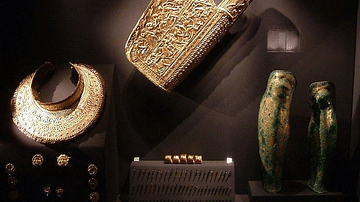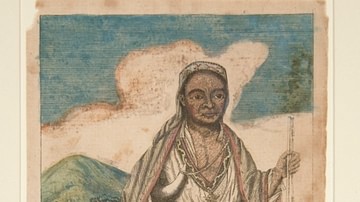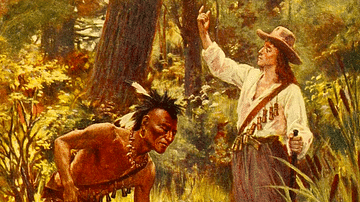Search
Did you mean: Philippi?
Search Results

Definition
Argead Dynasty
The Argead dynasty, the ancient Macedonian house of Dorian Greek origin, lasted from the 7th century to 310 BCE. The mythological founder of the dynasty was King Caranus but it was under Philip II of Macedon (382-226 BCE) that the Macedonian...

Article
Warrior Women of the World of Ancient Macedon
The 8th November is celebrated as Archangels Day in Greece, but on that November day in 1977 CE something remarkable happened: an excavation team led by Professor Manolis Andronikos were roped down into the eerie gloom of an unlooted Macedonian-styled...

Definition
Perdiccas
Perdiccas (d. 321 BCE) was one of Alexander the Great's commanders, and after his death, custodian of the treasury, regent over Philip III and Alexander IV, and commander of the royal army. When Alexander the Great crossed the Hellespont...

Definition
Aetolian League
The Aetolian League was an ancient Greek alliance of the tribes that lived west of Athens and north of the Peloponnese. The league was probably first established in the early 4th century BCE, reached its peak during the Hellenistic Period...

Definition
Cynane
Cynane (l. c. 357- 323 BCE, pronounced `Keenahnay') was the daughter of the Illyrian Princess Audata and King Philip II of Macedon, making her the half-sister of Alexander the Great (l.356-323 BCE). Following the Illyrian tradition of women...

Definition
Cleopatra of Macedon
Cleopatra of Macedon (355/4-308 BCE), daughter of Philip II of Macedon (reign 359-336 BCE) and his Molossian queen, Olympias of Epirus (c. 375-316 BCE), was the only full sister of Alexander the Great (reign 336-323 BCE). Born in Pella, the...

Definition
William the Silent
William the Silent (l. 1533-1584, also known as William of Orange) was the leader of the Dutch Revolt (the Eighty Years' War) in the Netherlands; first politically (between 1559-1568) then militarily (between 1568-1584). He is among the most...

Definition
Demosthenes
Demosthenes (c. 384 - 322 BCE) was an Athenian statesman who famously stood against Macedonian king Philip II and whose surviving speeches have established him as one of the greatest patriots and powerful orators from ancient Greece. He is...

Image
King Philip (Metacom)
Philip, King of Mount Hope, line engraving depicting Metacom (also known as King Philip, l. 1638-1676), colored by hand, by the American engraver and silversmith Paul Revere, illustration from page 88 of The Entertaining History of King Philip's...

Image
Death of King Philip or Metacom
An early 20th-century illustration showing the death of King Philip, aka Metacom (l. 1638-1676) who led a coalition of Native American tribes in King Philip’s War (aka Metacom’s War, 1675-1678) against English colonists.